Dr. Cecilia Rosales Celebrated at Retirement Reception
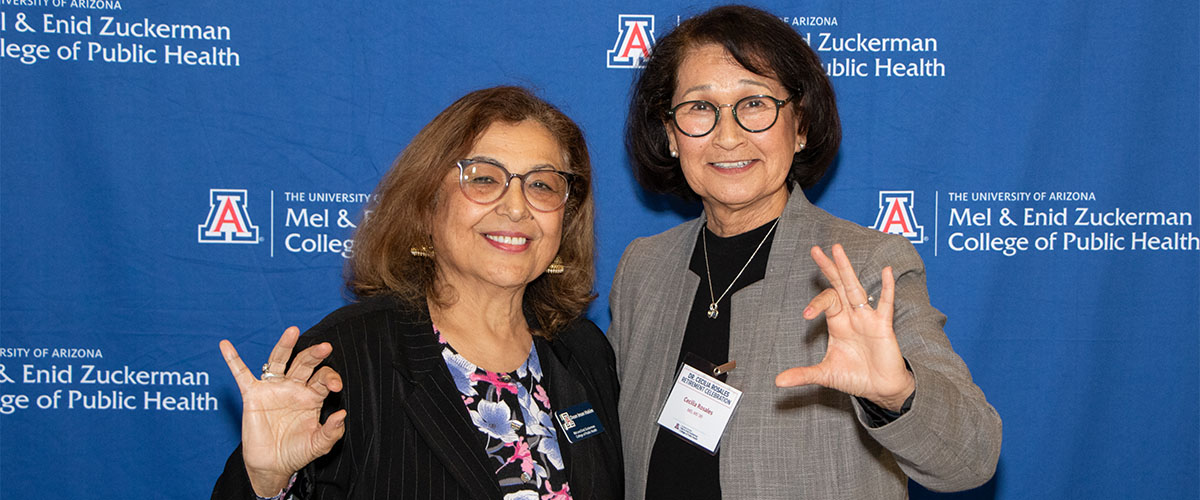
At a recent retirement reception for Dr. Cecilia Rosales, professor emeritus and former associate dean in the Zuckerman College of Public Health, more than a hundred friends, colleagues, alumni, students and family members gathered to celebrate all that Dr. Rosales accomplished across the span of her career to benefit the college, the Southwest, and the US/Mexico border region.
Cecilia Rosales, MD, MS ‘00, former associate dean of Community Engagement and Outreach, former associate dean of the Phoenix Campus for the Zuckerman College of Public Health, and former chair and professor emeritus in the Department of Public Health Practice, Policy, and Translational Research, recently retired. In January 2024, more than a hundred friends, colleagues, alumni, students, and family members gathered to celebrate all that Dr. Rosales accomplished across the span of her career with the College. Her knowledge, leadership, and network have made a profound impact on the health and lives of so many communities in the Southwest and US/Mexico border region.
As a public health educator and researcher (and an alumna of the college), Dr. Rosales inspired dozens of students and colleagues to push for change, take on leadership roles, and make the world a better place. She was also instrumental in collaborating with Mexico’s Secretaria de Salud to launch the Mobile Health Unit program and the Ventanillas de Salud program, both designed to reach underserved communities with health screening and services. The programs were so successful that they have now expanded nationally.
The Mobile Health Unit also serves as a practical training ground, bringing together professionals from diverse disciplines to collaborate seamlessly in delivering comprehensive care. As a result, this innovative approach not only improved health outcomes for communities in need, but also promoted a culture of interdisciplinary teamwork that will undoubtedly influence the future of healthcare initiatives. Dr. Rosales’ legacy includes her lasting impact on the way we approach healthcare delivery and education.
A Visionary Leader for Public Health
Dr. Rosales’ tireless dedication to the field of border health and health disparities has left a lasting mark on our College, University, and State, as well as nationally and globally. Her contributions to advance our understanding of health issues at the intersection of borders have been nothing short of exemplary. In recent years, Dr. Rosales collaborated with El Colegio de Sonora and the Secretaria de Salud de Sonora on a National Institutes of Health RO1 grant titled, Tools and practices to decrease cardiovascular disease and complications in the diabetic population of Mexico. The research project aimed to test the effectiveness of certain tools and practices to decrease cardiovascular disease and complications from diabetes. The aim is to scale up the intervention to the national level.
Currently, Dr. Rosales is recruiting Mexican mothers in Nogales, Sonora and Mexican-American mothers in Tucson, Arizona for a Binational Early Asthma and Microbiome Study (BEAMS), that aims to identify the environmental microbes and their products present in the border city of Nogales, Mexico, that cause children born there to have four times less asthma than Mexican-American children born in Tucson, Arizona. The study is being conducted in collaboration with El Colegio de la Frontera Norte and the Secretaria de Salud de Sonora in Mexico, and the UArizona College of Medicine – Tucson, UArizona Respiratory Sciences, and the University of San Francisco. In addition, the study will determine differences in microbial communities present on both sides of the border, and identify immune responses that asthma-protective microbes induce in both young children and mice. With this data, researchers hope to find ways to prevent asthma in the future.
In 2016 Dr. Rosales was awarded a grant by the Mexico Section of the U.S.-Mexico Border Health Commission. The project developed and implemented a primary prevention mobile health unit to provide access to health services and promote healthy lifestyles to the Latino population in Maricopa County. Dr. Rosales worked with a team of interprofessional students and faculty from the UA Health Sciences in Phoenix to provide health outreach services through the Mobile Health Unit (MHU) to residents who lack access to health services or are underinsured. The MHU’s strong success has attracted other funding that enabled the program to expand. Dr. Rosales was also named a member of the Academic Technical Council of the Binational Border Health Network. The network is comprised of experts from 10 border states to improve response to the challenges posed by public health conditions on the U.S.-México border.
Dr. Rosales served as the private sector co-chair of the Health Services Committee of the Arizona-Mexico Commission. Her deep understanding of how the public health infrastructure can be strengthened at the local, state, national and binational level to address health disparities in this region, enabled significant and beneficial changes. With years of experience, and her passionate commitment to the elimination of health disparities, Dr. Rosales mentored many students and encouraged them to pursue health sciences majors and interprofessional opportunities. She developed a strong academic and community network through her years of research, practice and service. Dr. Rosales worked collaboratively with a multidisciplinary and binational cadre of interested parties, including academics, non-profit professionals, and governmental officials.
Across her 17 years with the Zuckerman College of Public Health, Dr. Rosales demonstrated outstanding expertise and scholarship in the areas of program development and implementation, public health administration and policy, and health disparities research related to the Southwest and border region. Her comprehensive understanding of the region enhanced community-based participatory research and collaboration in the Southwest and contributed significantly to the body of knowledge associated with border and Binational Health in general. The U.S.-Mexico Border Health Commission, the Arizona-Mexico Commission, the Border Governors and the state health departments in Arizona and Sonora have benefited from her innovative and creative strategies for strengthening the public-health infrastructure in this region.
Dr. Rosales earned her BS in Public Administration from the University of Arizona in 1976, her MD from the Universidad Autónoma de Ciudad Juarez in 1987, and her MS in Epidemiology from the UArizona College of Public Health in 2000.
“On behalf of the entire college community, I extend our deepest gratitude for Cecilia’s years of dedicated service,” said Iman Hakim, Dean of the Zuckerman College of Public Health, “Her impact will resonate for generations to come, and her presence will be sorely missed. We want her to keep in touch and know that she will always have a special place in the heart of our academic family.”
See the photos from Dr. Rosales’ Retirement Reception > Watch the video from Dr. Rosales’ Retirement Reception >
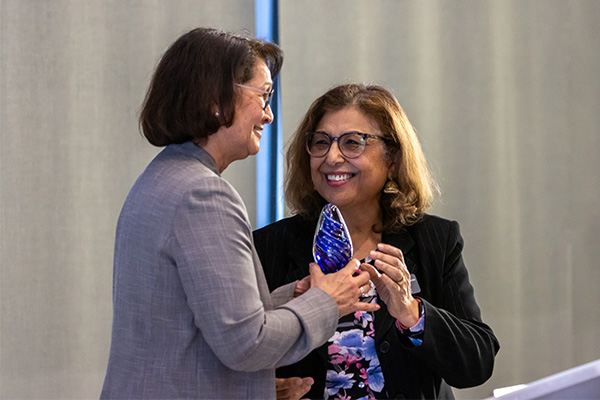
Dean Hakim give Dr. Cecilia Rosales an award for her 18 years at the UA
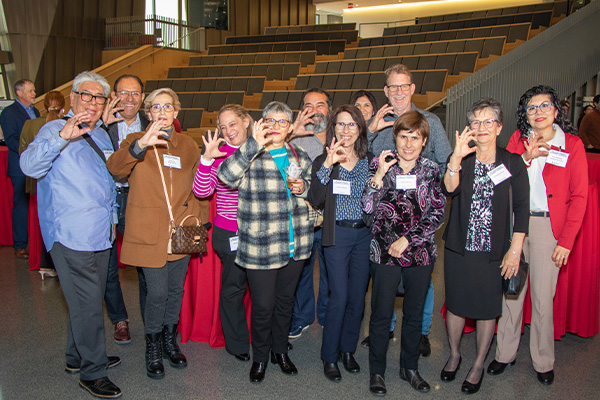
Guests from Phoenix, Mexico and Tucson celebrate Dr. Rosales
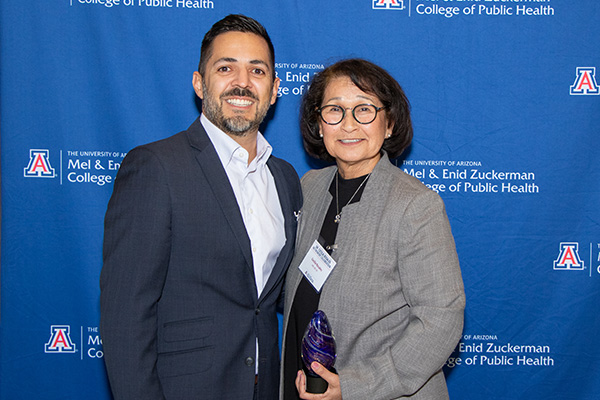
Dr. Rosales with Nick Meza JD, MPH '08, BS '06
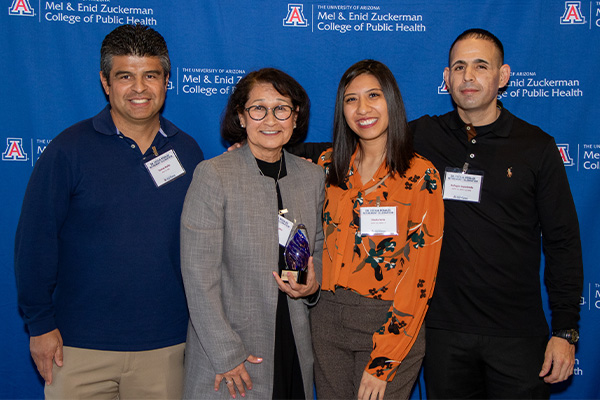
Dr. Rosales with Tomas Nuño PhD ‘11, MA, Sheila Soto DrPH '23, MPH '17, and Refugio Sepulveda DrPH '17, MPH '12, MPA
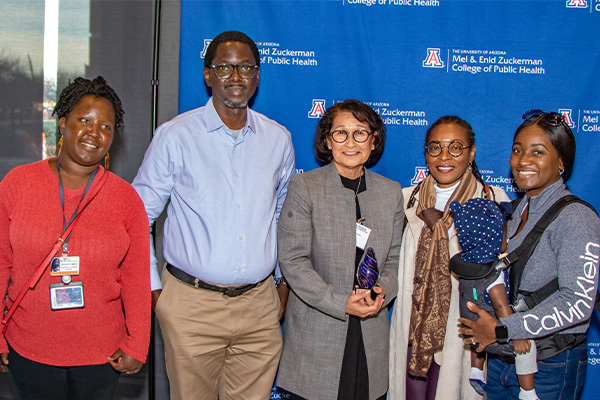
Dr. Rosales with alumni, faculty, and friends
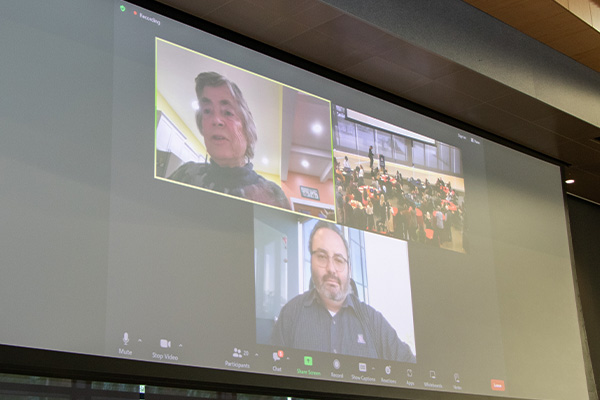
Folks zoomed into the celebration to share remarks including Dean Emerita G Marie Swanson
We invite you to continue Dr. Rosales’ legacy at the Zuckerman College of Public Health and contribute to the Mobile Health Unit program. The Mobile Health Unit provides free preventive health screening assessments and access to health services to underserved populations by targeting key priority issues such as nutrition, obesity, diabetes, mental health, and domestic violence, to name a few.

